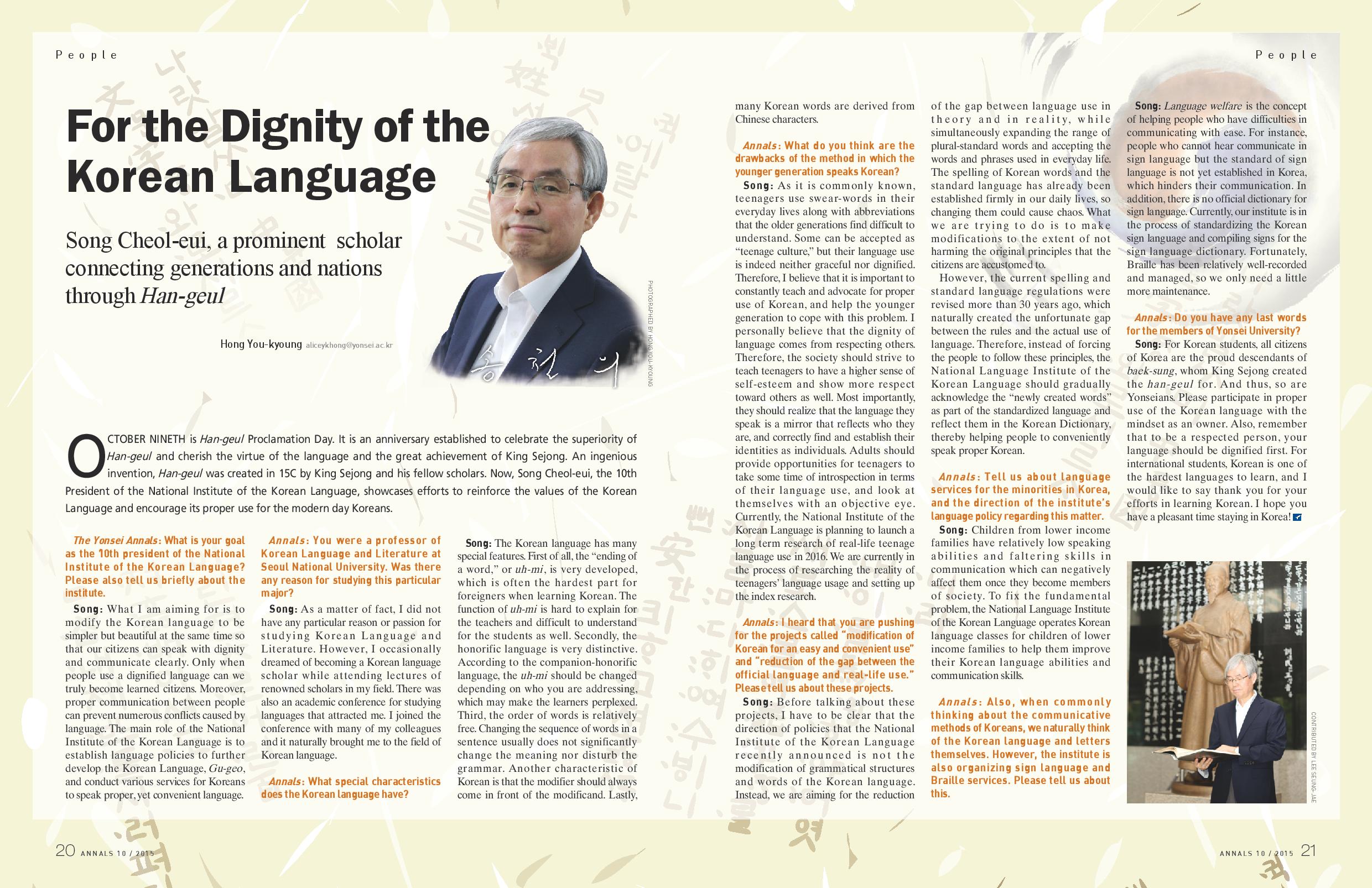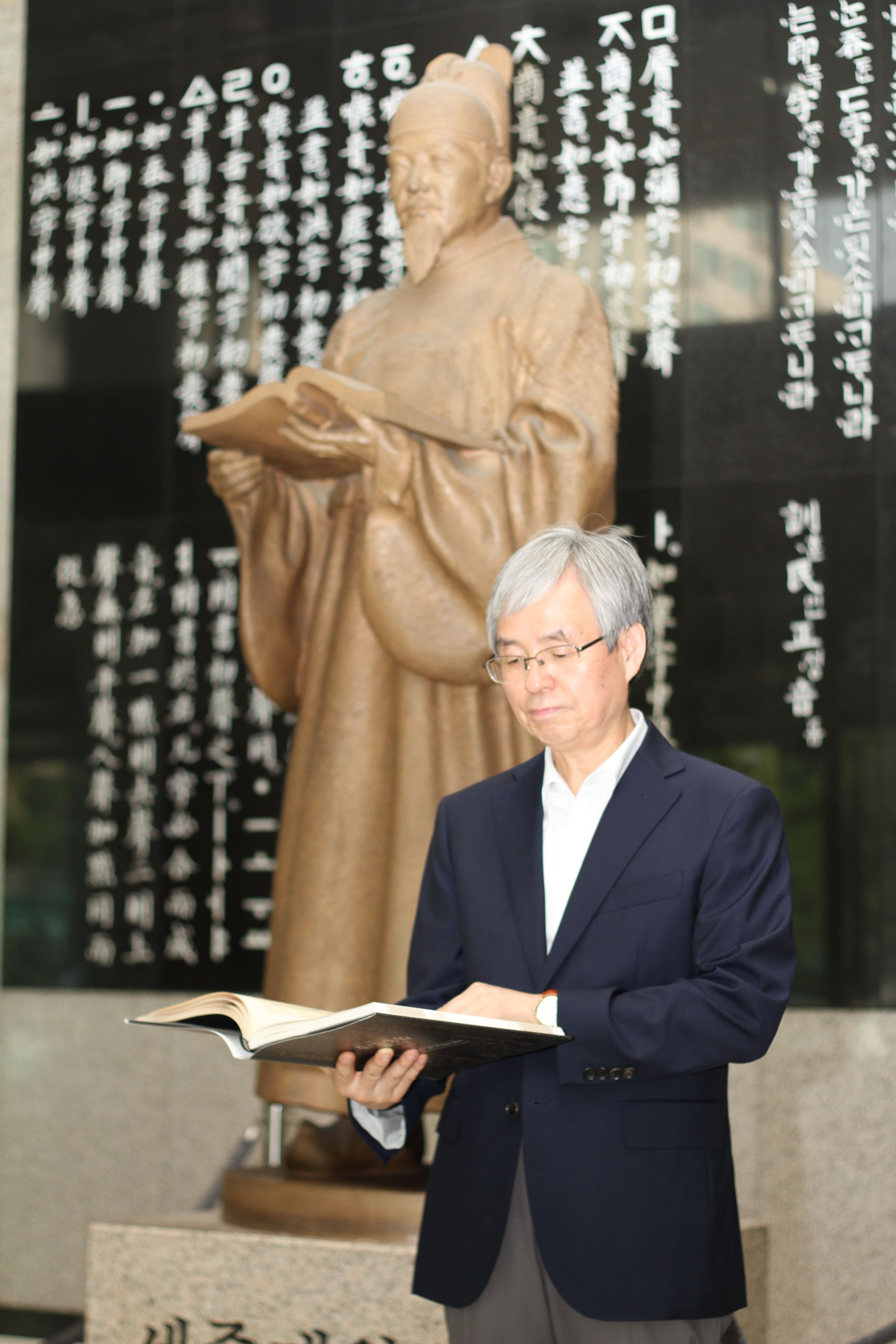Song Cheol-eui, prominent scholar connecting generations and nations through Han-geul
 | ||
 | ||
OCTOBER NINETH is Han-geul Proclamation Day. It is an anniversary established to celebrate the superiority of Han-geul and cherish the virtue of the language and the great achievement of King Sejong. An ingenious invention, Han-geul was created in 15C by King Sejong and his fellow scholars. Now, Song Cheol-eui, the 10th President of the National Institute of the Korean Language, showcases efforts to reinforce the values of the Korean Language and encourage its proper use for the modern day Koreans.
The Yonsei Annals: What is your goal as the 10th president of the National Institute of the Korean Language? Please also tell us briefly about the institute.
Song: What I am aiming for is to modify the Korean language to be simpler but beautiful at the same time so that our citizens can speak with dignity and communicate clearly. Only when people use a dignified language can we truly become learned citizens. Moreover, proper communication between people can prevent numerous conflicts caused by language. The main role of the National Institute of the Korean Language is to establish language policies to further develop the Korean Language, Gu-geo, and conduct various services for Koreans to speak proper, yet convenient language.
Annals: You were a professor of Korean Language and Literature at Seoul National University. Was there any reason for studying this particular major?
Song: As a matter of fact, I did not have any particular reason or passion for studying Korean Language and Literature. However, I occasionally dreamed of becoming a Korean language scholar while attending lectures of renowned scholars in my field. There was also an academic conference for studying languages that attracted me. I joined the conference with many of my colleagues and it naturally brought me to the field of Korean language.
Annals: What special characteristics does the Korean language have?
Song: The Korean language has many special features. First of all, the “ending of a word,” or *uh-mi*, is very developed, which is often the hardest part for foreigners when learning Korean. The function of uh-mi is hard to explain for the teachers and difficult to understand for the students as well. Secondly, the honorific language is very distinctive. According to the companion-honorific language, the uh-mi should be changed depending on who you are addressing, which may make the learners perplexed. Third, the order of words is relatively free. Changing the sequence of words in a sentence usually does not significantly change the meaning nor disturb the grammar. Another characteristic of Korean is that the modifier should always come in front of the modificand. Lastly, many Korean words are derived from Chinese characters.
Annals: What do you think are the drawbacks of the method in which the younger generation speaks Korean?
Song: As it is commonly known, teenagers use swear-words in their everyday lives along with abbreviations that the older generations find difficult to understand. Some can be accepted as “teenage culture,” but their language use is indeed neither graceful nor dignified. Therefore, I believe that it is important to constantly teach and advocate for proper use of Korean, and help the younger generation to cope with this problem. I personally believe that the dignity of language comes from respecting others. Therefore, the society should strive to teach teenagers to have a higher sense of self-esteem and show more respect toward others as well. Most importantly, they should realize that the language they speak is a mirror that reflects who they are, and correctly find and establish their identities as individuals. Adults should provide opportunities for teenagers to take some time of introspection in terms of their language use, and look at themselves with an objective eye. Currently, the National Institute of the Korean Language is planning to launch a long term research of real-life teenage language use in 2016. We are currently in the process of researching the reality of teenagers’ language usage and setting up the index research.
Annals: I heard that you are pushing for the projects called “modification of Korean for an easy and convenient use” and “reduction of the gap between the official language and real-life use.” Please tell us about these projects.
Song: Before talking about these projects, I have to be clear that the direction of policies that the National Institute of the Korean Language recently announced is not the modification of grammatical structures and words of the Korean language. Instead, we are aiming for the reduction of the gap between language use in theory and in reality, while simultaneously expanding the range of plural-standard words and accepting the words and phrases used in everyday life. The spelling of Korean words and the standard language has already been established firmly in our daily lives, so changing them could cause chaos. What we are trying to do is to make modifications to the extent of not harming the original principles that the citizens are accustomed to.
However, the current spelling and standard language regulations were revised more than 30 years ago, which naturally created the unfortunate gap between the rules and the actual use of language. Therefore, instead of forcing the people to follow these principles, the National Language Institute of the Korean Language should gradually acknowledge the “newly created words” as part of the standardized language and reflect them in the Korean Dictionary, thereby helping people to conveniently speak proper Korean.
Annals: Tell us about language services for the minorities in Korea, and the direction of the institute’s language policy regarding this matter.
Song: Children from lower income families have relatively low speaking abilities and faltering skills in communication which can negatively affect them once they become members of society. To fix the fundamental problem, the National Language Institute of the Korean Language operates Korean language classes for children of lower income families to help them improve their Korean language abilities and communication skills.
Annals: Also, when commonly thinking about the communicative methods of Koreans, we naturally think of the Korean language and letters themselves. However, the institute is also organizing sign language and Braille services. Please tell us about this.
Song: Language welfare is the concept of helping people who have difficulties in communicating with ease. For instance, people who cannot hear communicate in sign language but the standard of sign language is not yet established in Korea, which hinders their communication. In addition, there is no official dictionary for sign language. Currently, our institute is in the process of standardizing the Korean sign language and compiling signs for the sign language dictionary. Fortunately, Braille has been relatively well-recorded and managed, so we only need a little more maintenance.
Annals: Do you have any last words for the members of Yonsei University?
Song: For Korean students, all citizens of Korea are the proud descendants of baek-sung, whom King Sejong created the Han-geul for. And thus, so are Yonseians. Please participate in proper use of the Korean language with the mindset as an owner. Also, remember that to be a respected person, your language should be dignified first. For international students, Korean is one of the hardest languages to learn, and I would like to say thank you for your efforts in learning Korean. I hope you have a pleasant time staying in Korea!
Hong You-kyoung
aliceykhong@yonsei.ac.kr

